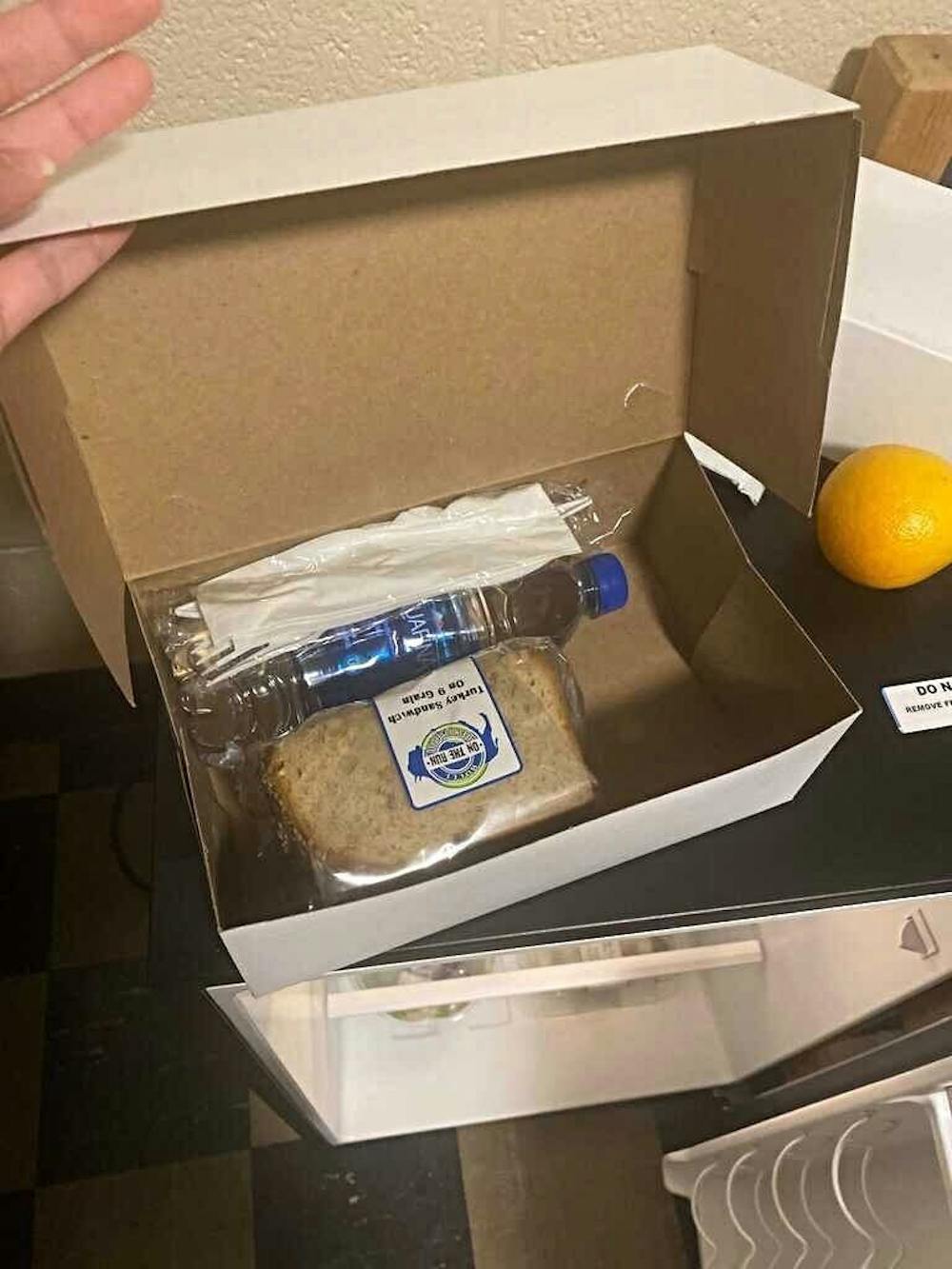Samuel Magaseyev entered UB quarantine on Sept. 24 with a 103-degree fever, nausea, vomiting and fatigue.
The freshman biology major left his New York City home for the first time in August and has been completely reliant on the care of UB staff at Goodyear Hall’s quarantine dorms as he battles moderately severe COVID symptoms.
Magaseyev says UB is not doing enough to ensure student safety and cleanliness at Goodyear. The food, he says, is not filling enough for a college student, nor nutritious enough for a student who is ill and vomiting regularly. His quarantine dorm, which initially appeared clean, was outfitted with a dirty, hair-filled refrigerator, a “filthy” work space and a rusty shower littered with pubic hair.
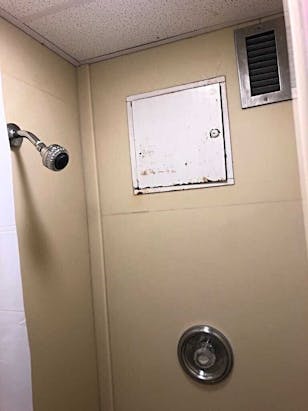
Students complained on UBreddit about showers including rusty electric boxes
“I have no clue how this could possibly happen, but the inside of the fridge has the same [hair] issue [as the shower.] It looks like they didn't properly sanitize the room before I got here. Under the desks, it’s just filthy. There are crumbs of something all over,” Magaseyev said.
Magaseyev’s greatest concern, however, is Campus Dining and Shops’ repeated failures to address his severe nut allergy, despite his pleas for allergy-safe foods. Magaseyev’s allergies have left the freshman unable to eat many of the most calorie-dense foods in his meal packages.
“I have told [CDS] to stop giving me snacks with nuts in them and always get a positive response, but nothing has come of it. I’m still getting Kind Bars and Clif Bars,” he said.
Magaseyev is also unable to eat the muffins or cookies that regularly accompany his meal packs because they are wrapped in unlabeled cellophane packages without nutrition labels. Only one vegan cookie in his food packages contained a scannable QR code. But that code provided no information on potential trace allergens, he said.
“I have a really bad allergy to tree nuts and peanuts so for me having a nutrition label to read to see the potential for cross-[contact] is a really big deal.”
If he ate the cookies or muffins included with his meal deliveries, he would likely end up in the hospital, he said.
Magaseyev became so frustrated with his living conditions that he began publishing quarantine food reviews and dorm tour vlogs on Youtube. Although he is one of UB’s most outspoken quarantine critics, he is far from the only student to complain about living conditions at Goodyear Hall.
UB currently reports 121 confirmed cases of COVID among students, faculty and staff, with 71 on-campus cases and 50 off-campus cases, according to UB’s COVID Dashboard. Forty-one students are currently quarantined or isolated at Goodyear Hall. The numbers at Goodyear Hall mix both quarantined students who are awaiting testing or test results after contact with a COVID-positive individual and isolated students who already tested positive for COVID. The Spectrum has contacted dozens of students since the start of the semester and all were critical of the living conditions at Goodyear. Some have likened their quarantine accommodations to prison cells. Others have taken to calling quarantine spaces “the gulags.”
Students complain of receiving still-frozen sandwiches, warm bottled water and small, unappetizing entrees. The only positive aspect of quarantine life, according to some students, is Goodyear's COVID Case Manager program, which pairs case managers with each student to determine how COVID guidelines apply to their specific situation.
Few students to whom The Spectrum spoke are willing to give their names for fear of university repercussions. The university has threatened to suspend students who violate COVID restrictions and some students fear those disciplinary threats will be extended to those who speak out about quarantine conditions.
Administrators at UB Campus Living and Campus Dining & Shops insist they are doing everything they can to improve quarantine conditions for students, including expanding meal options and ordering times and sanitizing rooms.
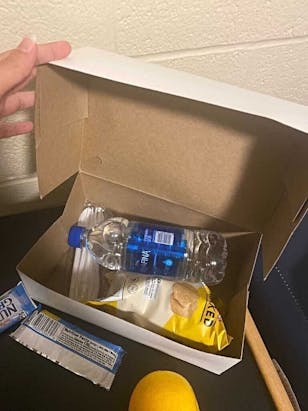
Student shows off snack box with water, chips, fruit and NutriGrain bars
Campus Living said staff observe stringent sanitation procedures. The procedures, according to Assistant Director of Communications and Marketing Initiatives for Campus Living Jessica Kane, include a “full cleaning” of “restroom floors and fixtures.”
“All quarantine rooms are being disinfected with an electrostatic sprayer and a chlorinating tablet prior to occupancy and after occupancy,” Kane said. “In addition to the sanitizing of the rooms, industry standard cleaning procedures such as high and low dusting, washing of all surfaces, [including] furniture, wall space, bed frames… are all being performed after occupancy. Full cleaning and sanitizing of restroom floors and fixtures [like] toilets, sinks, showers... before a new occupant arrives is being performed as well.”
CDS Marketing and Communications Manager Raymond Kohl says CDS should be able to do a “great job” meeting student allergy needs. He says CDS has served quarantined students with dietary restrictions before and that staff normally notify UB’s registered dietician when they learn a student with food allergies has entered quarantine.
“Campus Dining & Shops has a team dedicated to preparing the meals that students in quarantine receive, and the team can do a great job of meeting a student’s needs when the student reaches out and communicates directly” Kohl said. “Once a student arrives to their quarantine room, the team is notified by Campus Living and contact with the student through email is established… Once we are aware of a student that has a food allergy or dietary restriction, our Registered Dietitian is also notified and reaches out to them. The team has prepared several meals for students in quarantine that have had either dietary restrictions or food allergies.”
Kohl said Clif and Kind Bars come with a “welcome basket” given to all quarantined students. He did not specifically comment on the unlabeled baked goods Magaseyev received or Magaseyev’s claim that CDS continued sending him nut bars after he informed CDS workers of his allergy during a phone call.
“Prior to room occupancy, a standard care package from Campus Living and Campus Dining & Shops is placed inside, which contains a selection of items, including Kind [or] Clif Bars,” Kohl said. “It is not known ahead of time if a student has a dietary restriction [or] allergy.”
Quarantine Gripes and Social Media Hype
Complaints about quarantine conditions are not new at UB or universities nationwide, where students have taken to social media, particularly TikTok, to document their quarantine experiences.
Last month, one UB student's Reddit post about poor quarantine conditions went viral, capturing local media attention. The Spectrum reported on the student's gripes about inappropriately portioned meals, restricted water supplies, cockroaches and hand soap shortages. Two days later, UB responded to the complaints by promising to reevaluate dining services and give students unlimited water.
On Sept. 13, UB also announced the introduction of weekly themed quarantine meals. The first meal celebrated the start of the NFL season and included NFL-themed cut-out cookies, trail mix and Gatorade.
Some students found the cookies insulting.
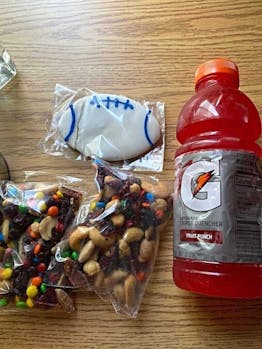
NFL-themed dinner package contains an NFL themed cookie, trail mix and a bottle of Gatorade
Darcy Smith*, a formerly quarantined student, called the cookies an example of UB’s “Band-Aid fixes.”
“I honestly feel like UB has been doing Band-Aid fixes for everything and will do almost anything to avoid dealing with the problems within the quarantine dorms directly,” said Smith. “I don’t really think cookies will help a sick person recover from COVID faster.”
CDS receives online orders from quarantined students on Thursdays and Fridays between 1 p.m. and 5 p.m. CDS staff members deliver meals to the curb of Goodyear Hall, where Campus Living employees pick up the packages and distribute them to students’ dorms. CDS employs two managers, one chef, three cooks and one driver to prepare, package, label and deliver meals. Campus Living also employs two resident assistants to deliver meals, according to Kane.
Daily deliveries include dinner for the day of the delivery and the next day’s breakfast and lunch. CDS contacts students regularly to survey student satisfaction.
Kohl says meals are planned to meet USDA nutritional guidelines.
The standard quarantine breakfast, as shown in Magaseyev’s food vlog, includes bottled orange juice, a cereal cup, one piece of fruit, a carton of low-fat milk, and a muffin. The breakfast, minus the muffin, contains about 578 calories.
Magaseyev argues that this is not enough food to nourish and satiate sick students.
“When I wake up, I eat the breakfast and lunch, which leaves me with no food for the rest of the day, [until the next delivery],” Magaseyev said. “After finishing a meal, I’m left hungry. Lunch is half a turkey, tuna or ham sub. If you want to add a salad, that’s another meal you have to spend.”
CDS currently charges $5.50 for breakfast and $10 each for lunch and dinner. Snacks range from $4 to $4.50. Students pay for meals using a credit card or campus dining plan.
UB automatically assigns all first-year student residents, like Magaseyev, a Flex 14 meal plan. The meal plan’s sticker price of $2,515 includes 14 weekly meals, or two meals a day. This means that Magaseyev must spend his 425 dining points or pay out-of-pocket in order to receive three meals a day. In quarantine, he has less choice over what those three meals contain and whether he can eat everything included with those meals, he says.
Magaseyev says Campus Living provides students running low on food with extra sandwiches. The sandwiches are an improvement from Campus Living’s earlier tight-fisted food policies, he says, but he doubts they are an effective solution to the larger problem of food access in the quarantine dorms.
“You can call up Campus Living and get some extra leftover food free of charge, but a turkey sandwich can only take you so far when you’re really hungry,” Magaseyev said.
Smith says those extra sandwiches also take hours to defrost.
“When I called down for some food on my first night in quarantine, they told me I could take some of the extra stuff. I asked for a ham and cheese sandwich and they gave it to me frozen. They were saying, ‘just wait a couple of hours for it to defrost.’ Like thanks bro, it’s not like I wanted to eat now,” Smith said.
Maya Levine*, who entered quarantine in early September, posted a photo of her efforts to defrost a bowl of stew with a blow dryer.

Maya Levine* posted this picture on UBreddit of her trying to defrost her bowl of stew with a hair dryer
Levine says UB students, to her knowledge, are only allowed to order food from CDS. Campus Living staff made an exception to the rule when Levine first arrived at the quarantine dorms. But, according to Levine, they chastised her for ordering McNuggets from a McDonald’s across the street instead of “bread and peanut butter” from a local Wegmans.
Campus Living told The Spectrum that it constantly reevaluates its policies and has launched an initiative to “facilitate deliveries from local food vendors.”
“We just launched a new initiative to facilitate deliveries from local food vendors. Designated times for these deliveries are Tuesday and Friday afternoons,” Kane said. “We constantly review all of our protocols to determine if there are additional needs.”
Kane did not specify the program’s launch date or which food vendors will partner with Campus Living.
Magaseyev is disappointed that it isn’t easier for students to order their own food. He says campus food prices are too high in general, but are particularly steep for quarantined students, especially considering the quality and quantity of the food they receive. “I feel like when you’re dealing with sick people, there should be enough food to the point where I shouldn’t be going, ‘I wish that I could order more food,’” Magaseyev said. “I understand this isn’t C3, but there’s a difference between being handed out rations… and getting unlimited food for $10.”
While some students’ families and friends are helping students circumvent costs by dropping off food at Goodyear Hall, Magaseyev's family lives too far away to do the same.
“When I told my family [I had COVID] they seemed really worried and asked if there was anything they could to help. They're 400 miles away in New York City, so the hard answer is ‘no,’” Magaseyev said.
While quarantine food has left students largely unsatisfied, access to drinkable water has improved since The Spectrum last spoke to students on Sept. 9. Students posted photos of dozens of water bottles waiting outside of their dorms to UB Reddit. Students were previously limited to two water bottles a day; one delivered with their lunch and dinner, respectively. Each additional water bottle previously cost $2.
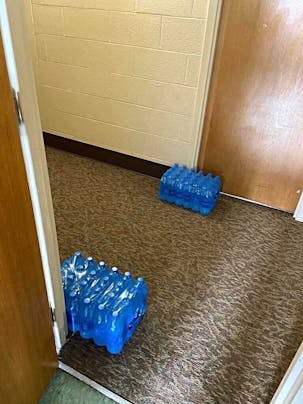
Student were limited to two water bottles a day before receiving a dozen outside their dorm rooms
But Smith, who called the quarantine food “trash” and “overpriced,” said the water is hardly more appealing.
"Water is free, but tastes like plastic because they left it in the sun for however long,” Smith said. My window had the shades up and the sunlight was hitting directly on [the package of bottled water]. It had a very apparent plastic taste to it.”
Smith says the only positive aspect of her experience was her quarantine case manager who “helped get her out.”
Until Magseyev gets out of quarantine, he hopes other students will continue to speak out about quarantine conditions. At the end of Magaseyev’s first vlog, he took a moment to thank the “brave” quarantined students who spoke out before him.
“I just want to thank everyone who toured the UB gulag before I did — to all the former prisoners,” Magseyev said. “You guys really suffered here… you really put down the building blocks and I just want to thank you from the bottom of my heart.”
* Student’s name has been changed because she fears retaliation
Elizabeth Napolitano is the senior news editor and can be reached at elizabeth.napolitano@ubspectrum.com or on Twitter @LizKNapolitano.
Elizabeth "Liz" Napolitano is the senior news editor for The Spectrum. She's an optimistic pessimist who found her love for journalism in Ecuador. She likes late night walks and reading Twitter threads in their entirety.

